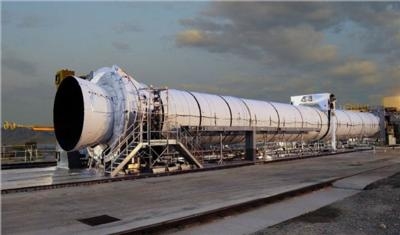Mon, Sep 11, 2017
Important Step Towards First Flight In 2019
Orbital ATK, a global leader in aerospace and defense technologies, recently completed an important qualification test of the avionics system for the solid rocket boosters the company has developed and is now manufacturing for NASA’s Space Launch System (SLS). Completion of this milestone is an important step toward preparing the SLS and Orion spacecraft for their first flight in 2019. Two Orbital ATK-developed five-segment rocket boosters will be used on each SLS launch to help provide initial thrust for the first two minutes of flight.

The avionics system is considered the “brains of the booster” as it starts booster ignition, communicates with the SLS launch vehicle computers during flight, and initiates booster separation upon completion of the first stage burn. The system is now qualified as meeting NASA’s demanding human-rating requirements, which provide a level of redundancy to ensure a safe flight environment through various phases of lift-off, ascent and staging.
“Completion of booster avionics system qualification is a significant step forward in supporting overall vehicle qualification and launch of the first flight of SLS – Exploration Mission-1,” said Jeff Foote, Vice President of NASA Programs for Orbital ATK’s Propulsion Systems Division. “We are proud of this accomplishment and look forward to completing full certification of the booster later this year.”
Qualification of the booster avionics system included a rigorous and comprehensive test series that thoroughly verified the fidelity of the system in a variety of expected and abnormal conditions. Key interactions confirmed during qualification testing included the ability to initiate booster ignition, control the booster during flight, and terminate flight.
The Space Launch System is NASA’s new heavy-lift launch vehicle that is being built to take crew and cargo to destinations beyond earth orbit, including to cislunar space and eventually Mars. SLS, along with the Orion spacecraft, will enable human exploration on a variety of missions to deep space. It has the greatest capacity of any launch system ever built, ensuring continued American leadership in space exploration.
(Image provided with Orbital ATK news release)
More News
Also: Vertical Flight Society, NBAA Maintenance Conference, GA Honored, AMT Scholarship For the first time, students from Embry-Riddle’s Daytona Beach, Florida, campus took t>[...]
Hazardous Weather Information Summary of significant meteorological information (SIGMET/WS), convective significant meteorological information (convective SIGMET/WST), urgent pilot>[...]
"The need for innovation at speed and scale is greater than ever. The X-62A VISTA is a crucial platform in our efforts to develop, test and integrate AI, as well as to establish AI>[...]
(FAA) Inspector Observed That Both Fuel Tanks Were Intact And That Only A Minimal Amount Of Fuel Remained In Each Analysis: According to the pilot, approximately 8 miles from the d>[...]
“Pyka’s Pelican Cargo is unlike any other UAS solution on the market for contested logistics. We assessed a number of leading capabilities and concluded that the Pelica>[...]
 Airborne-Flight Training 05.09.24: ERAU at AIAA, LIFT Diamond Buy, Epic A&P
Airborne-Flight Training 05.09.24: ERAU at AIAA, LIFT Diamond Buy, Epic A&P ANN's Daily Aero-Term (05.07.24): Hazardous Weather Information
ANN's Daily Aero-Term (05.07.24): Hazardous Weather Information Aero-News: Quote of the Day (05.07.24)
Aero-News: Quote of the Day (05.07.24) NTSB Final Report: Cessna 150
NTSB Final Report: Cessna 150 Aero-News: Quote of the Day (05.08.24)
Aero-News: Quote of the Day (05.08.24)



